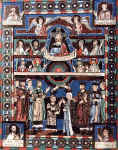Heinrich "The Lion"
|
 |
Heinrich the Lion, duke of Saxony and Bavaria, was among the outstanding personalities of the High Middle Ages. When Heinrich the Lion was born in Swabia at Ravensburg, the Welfs already had the duchies of Bavaria and Saxony at their disposal, a concentration of power which was created through historical marriage politics. The grandfather of Heinrich the Lion, Heinrich the Black (1075-1126), had married Wulfhild, the eldest daughter of the Saxon Duke Magnus Billung, and through her he inherited a powerful estate, with Lüneburg at its center. The father of Heinrich the Lion, Heinrich the Proud (1102-1139), married Gertrud, heiress of the Saxon duke Lothair III. (1075-1137). Through her Heinrich the Proud inherited the Duchy of Saxony in 1137. In 1138 the German king Konrad III (1093-1152). had sought to deprive Heinrich the Proud of his duchies, and when the duke died the following year the interests of his young son were maintained in Saxony by his mother, and his grandmother Richenza, widow of Lothair, and in Bavaria by his uncle, duke Welf VI. (1115-1191).
With the rise to power of the still minor-aged Heinrich the Lion in Saxony and Bavaria in 1139, the emperor's opposition to the strong position of the Welfs in the Empire increased. However, the two duchies of Bavaria and Saxony, which were denied to his father in 1138, were returned to Heinrich the Lion in 1142. But in order to secure the fief of Saxony, he reluctantly gave up all claim to Bavaria, which was given to Heinrich II. Jasomirgott (1114-1177), margrave of Austria, who married the Lion's mother, Gertrud. In 1147 Heinrich the Lion married Clementia, daughter of Konrad, Duke of Zähringen (d. 1152), and began taking an active part in administering his duchy and extending its area. But Heinrich had not forgotten Bavaria. In 1147 he made a formal claim on his duchy, and in 1151 he sought to take possession; but he did not obtain the support of his uncle Welf VI. and thus his effort failed. In February 1152 Heinrich's cousin, Friedrich I. Barbarossa (1123-1190), who was anxious to obtain the support of Heinrich the Lion, succeeded Konrad as German king in February 1152. Friedrich was at first unable to persuade Jasomirgott to relinquish Bavaria, but in June 1154 he recognized Heinrich's claim, and the Lion was officially invested with Bavaria in September 1156. Heinrich the Lion aided the emperor successfully in Italy and northern Europe. After a stellar career in the empire, the downfall of the Lion already loomed in 1166, when a coalition was formed against him at Merseburg under the leadership of Albrecht the Bear, margrave of Brandenburg, and Archbishop Hartwig. Friedrich I. made peace between the combatants in June 1168.
Heinrich the Lion had obtained a divorce from his first wife in 1162, and in February 1168 he was married to Mathilde (1156-1189), daughter of Henry II. (1133-1189), king of England. Soon he was sent by Freidrich I. on an embassy to the kings of England and France. In 1171 Heinrich's daughter, Gertrud, married the Danish Prince Canute, and in 1172 Heinrich made a pilgrimage to Jerusalem and was there received with great respect by the eastern emperor Manuel I. Comnenus (1122-1180) at Constantinople. He returned to Saxony in 1173.
Heinrich stood ever more in opposition to the empire and the emperor, and so he pursued his own interests. In 1176 he refused to follow Friedrich I. to Italy, which in 1179 led to a break between the Hohenstaufen and the Welfs. In January 1180 at the Imperial Diet in Würzburg, Heinrich the Lion was placed under imperial ban for refusing to answer certain complaints that had been brought against him, and he was declared deprived of the fiefs of Saxony and Bavaria. In November 1181, as part of a peace settlement, Heinrich the Lion received the counties of Lüneburg and Brunswick, but was banished under oath not to return without the emperor's permission. He went into exile with his entire family to his father-in-law in England. He returned to Germany in 1185 with the permission of the emperor, but in 1188, after rejecting the emperor's demand that he either renunciate his claim or participate in the crusade, he again went into exile in England in 1189. He returned to Saxony in October of that very same year on the ground that his lands had not been defended according to the Emperor's promise. He found many allies and soon held most of Saxony within his power. King Heinrich VI. (1165-1197) took the field against him, and in July 1190 a peace was arranged at Fulda, by which Heinrich the Lion retained Brunswick Lüneburg, received half the revenues of Lübeck, and gave two of his sons as hostages. Hoping to regain his former position, he took advantage of a league against Heinrich VI. in 1193 to engage in a further revolt; but the captivity of his brother-in-law Richard I. (1157-1199), king of England, led to reconciliation.
Heinrich the Lion passed his later years mainly at the castle of Brunswick, where he died on 6 August 1195 and was buried in the church of St. Blasius which he had founded. In 1235 his grandson, Otto the Child (1204-1252), was invested with the Duchy of Brunswick - Lüneburg. With that the Welfs, as dukes of Brunswick - Lüneburg, came back into princely standing.
--Adapted, with additions, from the website, Die Welfen
![]()
Sources
- The Encyclopædia Britannica, 13th edition. New York: The Encyclopædia Britannica, Inc., 1926.
- Jordan, Karl. Heinrich der Löwe: Eine Biographie. München 1980
- Judge, Harry, ed. Cambridge Illustrated History. 3 vols. New York: Oxford University Press, 1988.
Web





